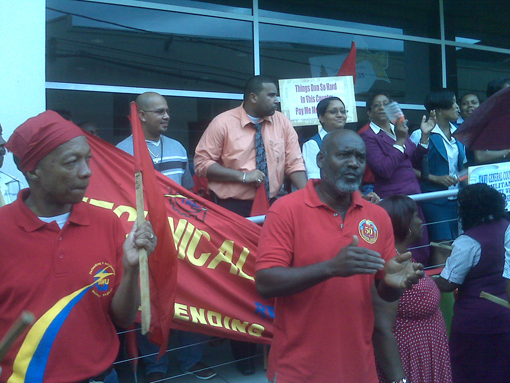Bank workers on strike over pay increase and benefits in Grenada

The Technical & Allied Workers’ Union after a near unanimous and successful strike ballot held on Monday 1st, November 2011 at the Public Workers’ Union Conference Centre was forced to take indefinite strike action at the RBTT Bank commencing last Thursday November 24th 2011.
THE ISSUES
- On December 14th, 2009 TAWU submitted proposals to amend the Collective Labour Agreement for the period July 1st 2009 to June 20th 2012. Those proposals covered Wage Increases, Allowances, Severance and Redundancy Principles including counselling for workers losing their jobs and “Voluntary Elective Termination” at first instance before Retrenchment & Redundancy etc; Full premium payment of Medical Insurance for Retirees; Indexation of Pensions to Inflation.
- Negotiations commenced on Tuesday March 9th 2010, became deadlocked on six (6) Articles, and were referred to the Ministry of Labour on September 10th 2010. The Labour Commissioner commenced hearings on November 24th 2010; thereafter he delivered his recommendation for settlement of the deadlocked matters on the June 24th 2011.
- TAWU compromised and accepted the Labour Commissioners Recommendations but RBTT rejected them and sought referral to the Minister of Labour.
- The parties went before the Labour Minister for mediation and on October 11th 2011 the Minister made her recommendations the Minister said “considering the [Bank of Nova Scotia settlement with TAWU] was between 5% and 8.5% she recommended a monthly increase to the Bank’s wage bill of EC$17,800.00 per month or approximately $600,000.00 over the 3 year period, which pans out to be an increase of 5% per year. The Bargaining Unit of TAWU at RBTT is 92 workers. The RBTT’s offer is a Basic salary Bill increase of approximately $5,000.00 per month.
An analysis of the Minister’s recommendation:
July 1, 2009 to June 30, 2010: 4.5%
July 1, 2010 to June 30 2011: 6%
July 1, 2011 to June 30, 2012: 4.5%
Let us look at the rate of inflation in those years. In 2008 the rate of inflation was 8% (with inflation on food 14%) while the increase to basic pay was 4%. In year 1 of the current Contract term 2009 the rate of inflation was 2%, Year 2 (2010) the rate of inflation was 6.03% and Year 3 (2011) so far 3%.
The additional 5% equals an improvement in the workers standard of living by 1.7% per year. So for example, a worker earning $2000.00 per month with a 15% increase on a straight line mathematical calculation will earn $300.00 over the 3 year period. $200.00 would represent the adjustment consistent with the inflation and $100.00 will represent the improvement in the workers standard of living (purchasing power) over the 3 year period which approximates $33.00 per month on a straight line calculation. Thus, on a $2000.00 a month salary the real increase in a worker purchasing power equals $33.00 per month; this is what the Minister recommendations represent. Now quite frankly if this amount is going to cause the Bank to reduce its employment levels what the Bank is really saying is that it is going to reduce staff levels regardless. Only in May of this year our Union secured the following basic pay increases in another competitor Bank: 6% increase in year 1; 5% increase in year 2; 5% increase in year 3 and 5% increase in year 4. These increases are separate and apart from merit pay which averages 5.85% for the four year period June 2010 to June 2013 - this average is what has and will be awarded for meeting expectations.
Analysis of Bank’s Proposal
The Bank’s 6% increase on a straight line mathematical calculation over a period of the same 36 months of a $2000.00 salary is $120.00 divided over the 3 year period is $40.00 per month which is less than $2.00 per day. The 9% one off pay offered by the Bank for the 3rd year has the following consequential effect:
1. No impact on a worker’s pension.
2. No impact on termination pay where a worker is made redundant - is retrenched and has to be paid Severance Compensation or Retrenchment pay. In this very difficult labour market the more compensation a Union can secure for a worker the better off is that worker’s family
3. No impact on future earnings.
The Union had calculated the Bank’s proposal in respect of its impact on basic pay to amount to an increase in basic salary of approximately $17,800.00 per month increase on basic direct salary cost or $600,000.00 over the 36 month of the contract of basic salary.
The Union is of the view that this is more than affordable bearing in mind that the $17,800.00 is divisible between 92 workers which is the size of our Bargaining Unit.
Source: GTAWU

